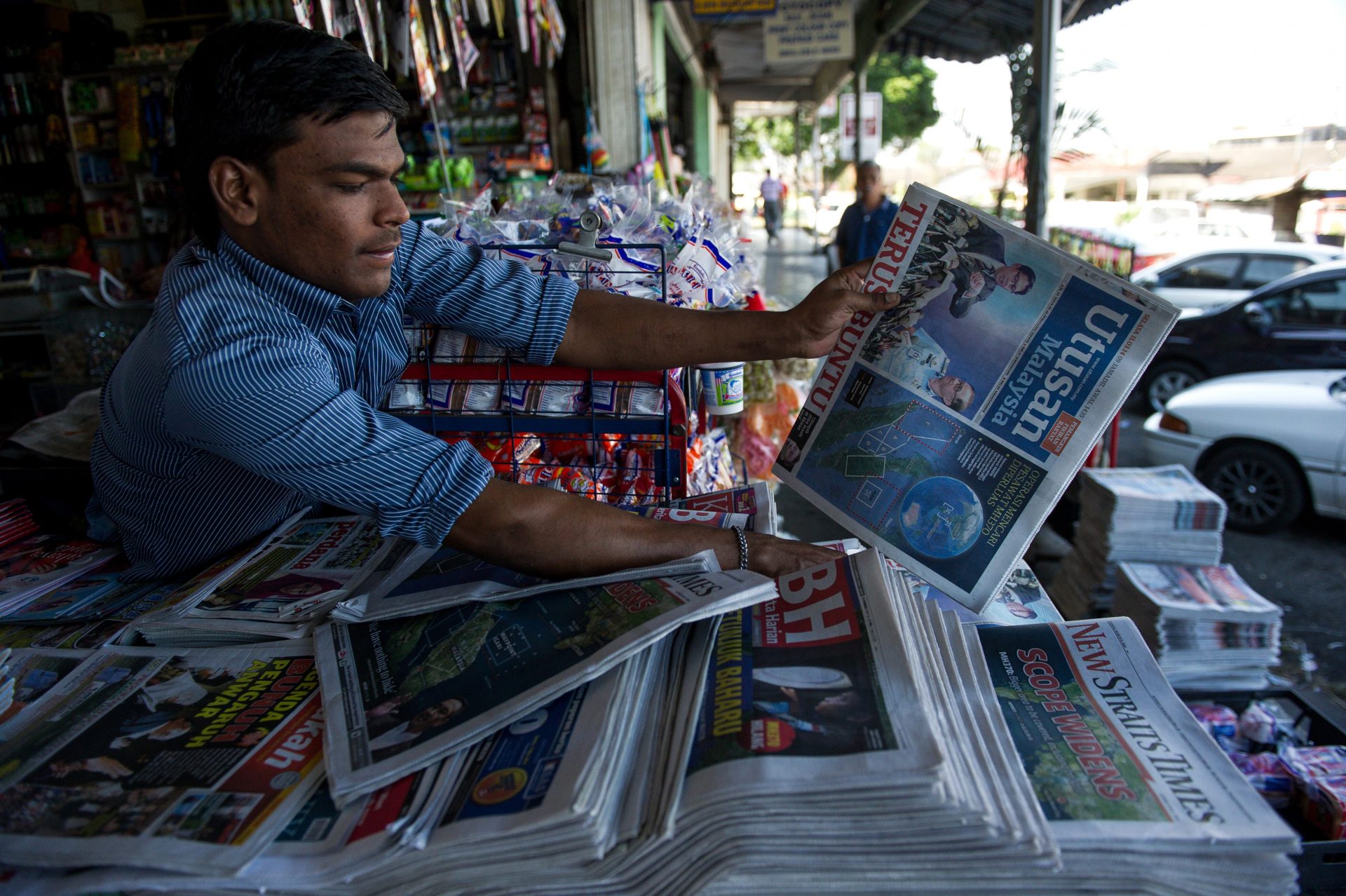The World Press Freedom Index is an annual ranking of press freedom spanning 180 countries across the world. Read on to see where Malaysia comes in on the list.
Freedom of the press is an important institution of any country because it plays a vital role in informing citizens about public affairs, while monitoring the actions of government at all levels. Journalists and people who work in media carry an immense responsibility to let the public know how their elected leaders are catering to the needs of the people they vowed to serve, without having to face censorship and persecution.
Unfortunately, that’s not how journalism is allowed to be implemented and practised in many countries, and freedom of press and expression has become a privilege that many countries are desperate for.
Reporters Without Borders (RSF), an international NGO with consultative status at the United Nations, has recently released their 2021 World Press Freedom Index — an annual ranking of press freedom spanning 180 countries across the world.
SCANDINAVIA DOMINATES THE TOP SPOTS
Norway, Finland, Sweden, and Denmark took places one to four on the the index, boasting the most effective press freedom. There must be something they’re doing right seeing how Scandinavian countries mostly come out on top in the world happiness index too. A very noticeable factor in government in these countries show a high percentage of competent women leaders which probably has something to do with it.

“Norway has for years been at or near the top of all democracy and free speech rankings,” RSF says.
In the top five with Scandinavia is Costa Rica!
SOUTHEAST ASIA FACES MASSIVE DRAWBACKS TO PRESS FREEDOM
“Journalism is the best vaccine against disinformation,” said RSF Secretary-General Christophe Deloire. “Unfortunately, its production and distribution are too often blocked by political, economic, technological, and sometimes, even cultural factors.”

One of the most notable changes in 2021 index is Malaysia’s position on the list. Back in 2020, the country ranked at 101 out of 180. This year, the ranking took a steep nose dive, 18 spots down to 119. This also constitutes the most severe deterioration in press freedom score on the list.
“When Malaysia experienced its first-ever transfer of power through elections in May 2018, the environment for journalists became much more favorable and the country rose dramatically in RSF’s Press Freedom Index,” the statement reads.
Sadly, the NGO points out that all of that progress was reversed in 2020. “For the media, the restoration of more authoritarian rule in 2020 has led to prosecutions, police searches, expulsions (of journalists and a whistleblower), and flagrant violations of the confidentiality of journalists’ sources.”
Surprisingly, there’s one country in the region that favours better press freedom than the rest; coming in at 72 on the list is Timor-Leste (East Timor).

However, despite doing relatively well (the bar in Southeast Asia is set quite low), Timor-Leste still suffers from “draconian media laws”, according to RSF.
Though there are guarantees of free speech and media freedom in the country’s constitution, other forms of pressure and intimidation are used against the press to stifle criticism against representatives of the state or the Catholic Church, which retains a lot of power in the country.
INDONESIA
A massive jump from Timor-Leste at 72, comes Indonesia at 113, where RSF says press freedom is “still pending in Jokowi’s second term.”

The wide gap between the neighbouring countries is not only significant, it’s an indicator of how the rest of Southeast Asia fares on the list. It’s also interesting to note though that Indonesia actually gained six spots up the rankings from 2020.
THAILAND
Coming in at 137 is Thailand. RSF cites greater control being handed to the Thai Prime Minister and the monarchy as the main reason for the country’s placement. Additionally, anyone who throws criticism at the monarchy faces harsh penalties.

“The threat of a lèse-majesté charge carrying a possible 15-year jail sentence continues to be used as a weapon of mass deterrence against dissident journalists and bloggers,” RSF says.
In spite of the public’s struggles with their leaders, Thailand managed to gain a few spots up the ranking, three to be specific.
PHILIPPINES
The Philippines is ranked at 138, due to resident Rodrigo Duterte’s penchant for public threats against journalists from the get go. In his alarming statement to the media when sworn in as president in June 2016, he said, “Just because you’re a journalist, you are not exempted from assassination if you’re a son of a b****. Freedom of expression cannot help you if you have done something wrong.”

When threats turned into action, 2020 saw four journalists murdered by thugs who were apparently on political payrolls.
MYANMAR
Unsurprisingly, with the February 2021 military coup being a main factor, Myanmar comes in at number 140.

“When the military junta disbanded itself in February 2011, after half a century in power, Myanmar’s journalists hoped they would never again have to fear arrest or imprisonment for criticising the government or military,” RSF says, commenting on the country’s 20-spot rise in press freedom between 2013 and 2017.
“The coup d’état of February 1, 2021 brought that fragile progress to an abrupt end and set Myanmar’s journalists back ten years.”
CAMBODIA
Behind Myanmar at 144, Cambodia manipulates the COVID-19 pandemic to silence the press, while enforcing strict censorship for all.
Unfortunately for Cambodia, the public only has access to state-run or state-affiliated media, which are basically pro-government propaganda outlets.

In retaliation to media censorship, the Cambodian Journalists Alliance formed in 2019 to provide journalists with some form of protection. However, it was not nearly enough to avoid criminal punishment for anything the government deems a ‘wrongdoing’.
On top of blocking news sites, journalists have been arrested and the country’s emergency proclamation allows for the government to interfere, spy, and cause disruptions to traditional and online media.
BRUNEI
Placed at 154, Brunei keeps their media under blatant censorship.
Under the country’s extreme implementation of Syariah law, any criticism against the Sultanate is considered ‘blasphemy’ and will be subjected to prosecution with minimum prison sentence of up to five years.

“Publishing any content that adversely affects the ‘prominence of the National Philosophy’ is punishable by three years in prison under the sedition law,” RSF states. Bloggers who post independently-reported information face criminal defamation charges, even if the post is deleted soon after publishing.
SINGAPORE
Famously known for being the most developed and prosperous nation in Southeast Asia, it comes as quite a surprise to see Singapore in the black (indicating that the situation is “very bad“) at 160! Given the facts, locals insist that it is not shocking at all seeing how quick the government is to sue critical journalists for defamation.

It’s an ironic turn of events for a country that was referred to itself as the ‘Switzerland of the East‘ back in the 70s, whose government now forces journalists into unemployment. Some are even pressured to leave the country in exile.
The country’s anti-fake news law also forces all media outlets to make ‘corrections’ to any piece of content that the government deems ‘incorrect’.
LAOS AND VIETNAM
Noted as the worst-performing in Southeast Asia for press freedom, Laos (172) and Vietnam (175) clinch spots at the bottom 10 of the index.

Seeing that the Lao People’s Revolutionary Party (LPRP) has complete and absolute control over the media in Laos, any foreign media outlets must submit to extreme censorship laws. It also comes as no surprise to learn that no one except for China’s Xinhua and Vietnam’s Nhan Dan have media presences in Laos.
Media in Vietnam are pressured to follow the orders of the country’s Communist Party. Despite the precarious situation, there exists a small band of independent bloggers who risk daily threats of persecution, and police violence with their reporting. And according to RSF, more than 30 journalists and bloggers are held in Vietnam’s prisons, often mistreated in detention.
Find the entire World Press Freedom Index here.
"ExpatGo welcomes and encourages comments, input, and divergent opinions. However, we kindly request that you use suitable language in your comments, and refrain from any sort of personal attack, hate speech, or disparaging rhetoric. Comments not in line with this are subject to removal from the site. "



















